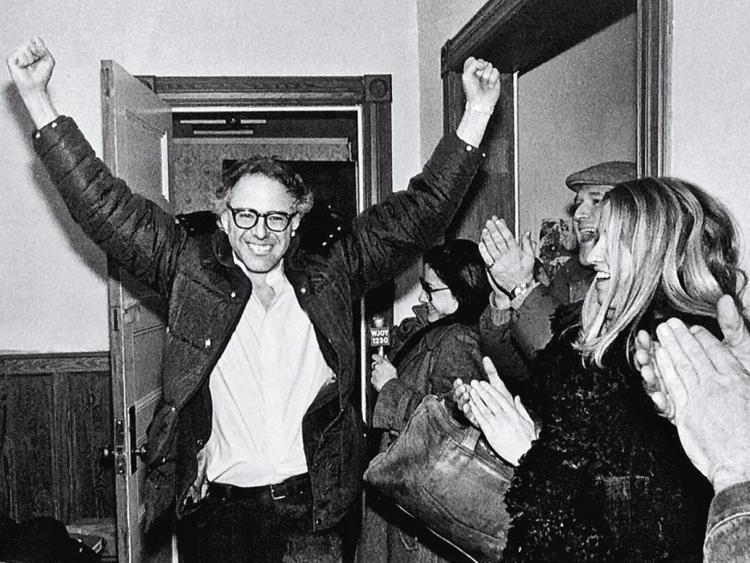Bernie Sanders and the Unexpected Rise of Principled Politics

If you follow American politics even on a cursory level, you’ve no doubt been barraged by images of Donald Trump’s face (and hair) in your newsfeed. Yet more interestingly, you’ve probably also been hearing the name Bernie Sanders. For most he is a new name that seemingly came from nowhere and is taking American politics by storm. Not so long ago, Hillary Clinton was the assumed Democratic candidate and likely next president of the United States. Recent polls however, show that Bernie’s position in key primary states is very optimistic, to the point where Hillary’s leading Super PAC is starting to get a bit vicious. So how is it that this bright-eyed, bushy-tailed 74-year-old who’s been in politics for over 34 years is just now resonating on a national level with the electorate?
Born the son of a Polish immigrant in a lower middle-class neighborhood of Brooklyn, New York in 1941, Sanders developed his political stance at an early age. While attending the University of Chicago, Bernie got deeply involved in social issues involving economic injustice and racial inequality and joined multiple organizations including the Congress of Racial Equality, the Student Nonviolent Coordinating Committee, the Student Peace Union and the Young People’s Socialist League. By the 1970s Sanders had moved to Vermont where he remained highly active in social movements and political activism. In 1972, he lead his first of four failed runs for office under the Liberty Union party, including two for Senate and two for governor.
(Photo: AP Photo/Donna Light)It wasn’t until 1981 that Sanders won his first election as mayor of Burlington, Vermont, the largest city in the state. He went on to hold this office for four terms, building a reputation as a fighter for left-wing and anti-war ideals. From Burlington he went to Washington, winning a seat in the House of Representatives in 1991 that he held for 16 years. In 2007 he moved up the chain by securing his seat as U.S. Senator from Vermont.
Which brings us to April, 2015, when Bernie Sanders announced his bid for the Democratic nomination for president. So how is it that the most far left member of the Senate is now leading a national movement that seems to grow everyday, even when for many Americans, the country seems to be getting more conservative?
It starts with social unrest. The country is angry in a way we haven’t seen for decades, caused by a number of factors:
-
The tension over violence from law enforcement towards minorities is at a fever-pitch;
-
Health-care “reform” was passed a few years ago, but doesn’t go nearly far enough to provide consistent, affordable care for all citizens;
-
LGBT rights are a national issue more now than at any other time;
-
While the global science community years ago reached consensus concerning the cause and impact of climate change, politicians fail to react and make any serious legislation to combat it;
-
With the passing of Citizens United, campaign finance has gone out of control, with corporations and billionaires now able to fund candidates through unseen channels and organizations without limit or review;
-
And most important to many Americans, income inequality is at crushing levels, where the “top 20% of US households own more than 84% of the wealth, and the bottom 40% combine for a paltry 0.3%.”
What’s refreshing about Bernie Sanders is that he actually addresses these issues in an honest, straightforward, and unwavering way. While other politicians have to 'evolve' on no-brainers like civil rights for gays, his positions haven’t changed much in thirty years. In congress, Bernie initially had a difficult time making friends with his colleagues in both parties, deriding them as corporatist “tools of the wealthy”. Bernie voted against the war in Iraq (which Hillary voted for). Bernie voted against the Patriot Act, which gave the federal government seemingly unlimited power to spy on U.S. citizens (which Hillary also voted for). It was in 2010 though that Sanders really made a national name for himself when he filibustered the extension of the Bush era tax cuts. You can watch all 8½ hours here.
(Photo: Marius Bugge, TheNation)With the state of national political rhetoric in recent history being so overwhelmingly partisan, with little actual legislation getting done, and with politicians seeming so disingenuous and beholden to donors, Americans have fallen into a deep apathy and apparently given up. It is in this climate that Bernie’s campaign, which refuses to take secret Super PAC money, refuses to run negative attack ads, and refuses to discuss anything but the issues, causes people to respond.
Bernie Sanders didn’t have to change to meet the public sentiment, he’s always been there. It’s just taken the country a long time to catch up with him. Big money and pandering may still win this election, but with the recent trends, there is hope that principles and compassion finally have a chance.









